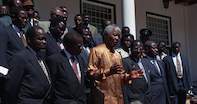
A Simple Life
Nelson Mandela rejected any suggestion that he was Africa's Messiah. "I don't think it is proper to look upon any single individual as being the messiah who is going to be the saviour of the continent", he told reporters when he was given an overwhelming welcome in Tunis at the 1994 annual summit of the Organisation of African Unity (OAU) - his first visit to that organisation as President. But many people see him in that light.
Unlike many other leaders on the world's stage, President Mandela brought a kind of saintliness to the presidency, created in large measure by his incredibly long term in jail and his refusal to entertain any bitterness against the people who forced him to undergo those bleak, unproductive years. Unlike other heads of state who have abused their high office, amassed huge fortunes and indulged themselves in luxurious lifestyles, President Mandela lived simply and made his presidency a platform from which to extend aid.
He established a special President's Children's Fund with a personal donation from his salary of R 150 000 (US $41 000) a year for five years and invited others to join by paying a similar entrance fee. Many businessmen have. He has also used the weight of the presidency to give impetus to the initiatives that resulted in breakfasts for primary school children and the provision of free care at hospitals and clinics for pregnant mothers and small children.
A Discredited OAU Summit
At the Tunis OAU summit in June 1994, a reporter described President Mandela as "the moral voice of Africa". In the setting of that north African city with its repressive regime and the pomp and ceremony of a discredited OAU summit, coupled with the presence of so many of the repressive and corrupt leaders of Africa, the appellation had a point.
Reporters asked whether the South African delegations would try to bring to the OAU the moral values which South Africa is adopting through its new constitution with its emphasis on transparency in government and freedom of expression and movement.
President Mandela and his delegation politely sidestepped these issues and, indeed, in the year that followed, he and the South African government have continued policies which broadly can be described as "non-interference in the internal affairs of others" but urging cooperation among nations.
Though President Mandela urged countries to adopt democratic principles and uphold human rights he, at the same time, tended to overlook the repression of human rights, involvement in terrorism etc, by countries which supported the ANC during its years of struggle.
This led to embarrassing moments in South Africa's relationships with the United States and Western countries which frowned on President's Mandela's friendships with Libya, the North African pariah accused of the destruction of a Pan American Airlines "jumbo jet" over Lockerbie in Scotland in 1988, and Cuba's Fidel Castro whom the Americans have never forgiven for nationalising substantial US business interests with hardly any compensation and for secretly installing nuclear missiles on the island. South Africa's oil deals with Iran have also caused friction with the United States.
Dominant Power in Africa
But, despite these glitches, the United States and Europe looked to President Mandela and South Africa to become the dominant power in Africa, the peacekeeper and the economic generator.
Both America and Europe have poured millions of dollars into Africa down the years and they have not been greatly impressed with the results. An unduly high proportion of that wealth has landed up in the personal coffers of some of Africa's leaders while their countries have continued to sink into decay.
Now, with its apartheid past behind it, America and Europe urged South Africa to take up the leadership role on the continent. They would like to see their African burden reduced and more of it shifted on to Africans themselves. And who better, they reasoned, to assume some of this load than President Mandela and South Africa? At the same time, among African nations, South Africa emerged as the hope of Africa.
Many of these nations were hard put to contain their impatience over the time taken for the transformation negotiations to be concluded in South Africa. President Mandela was propelled to a leadership role on the continent and helped to put out fires in Lesotho while exerting influence in Nigeria, Mozambique and other countries.
But President Mandela recognised the neat trap he could fall into — become a saviour token for Africa while chaos develops at home. So wisely he chose to assume a cautious role in Africa while devoting his maximum attention to his internal problems.
 'Since then I have watched the concept grow, gain structure and strength and become a real, viable, and pragmatic initiative,' said Mandela....
'Since then I have watched the concept grow, gain structure and strength and become a real, viable, and pragmatic initiative,' said Mandela.... Nelson Rolihlahla Mandela is a former president of South Africa, the first to be democratically elected after the apartheid system was aboli...
Nelson Rolihlahla Mandela is a former president of South Africa, the first to be democratically elected after the apartheid system was aboli...